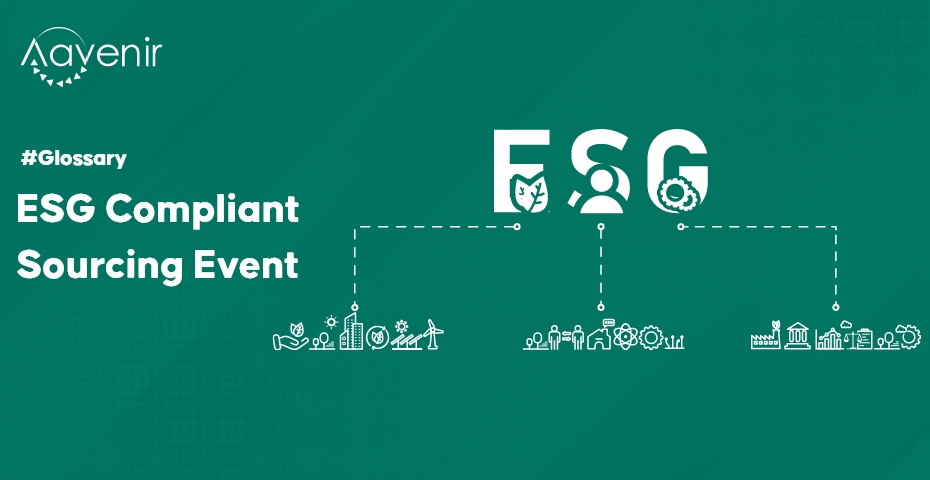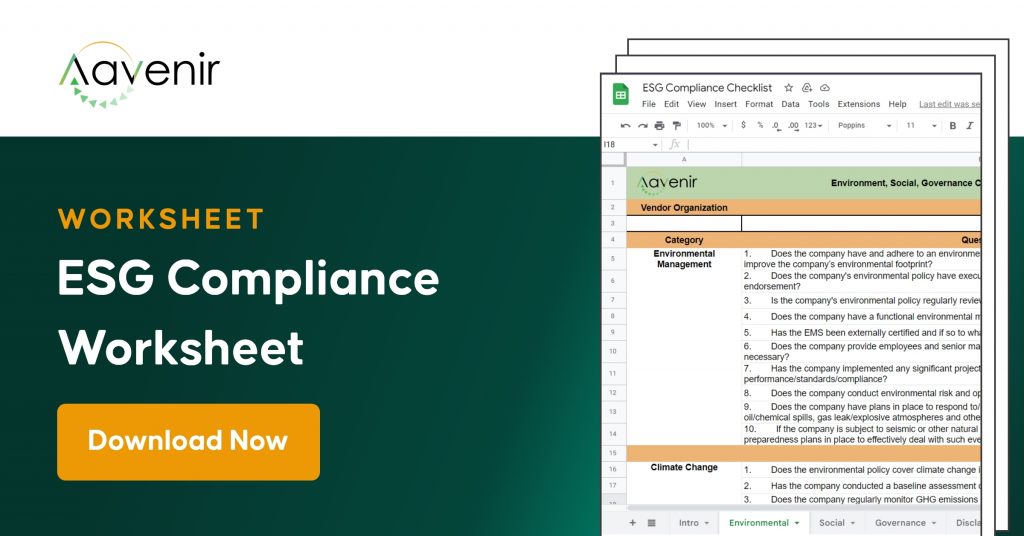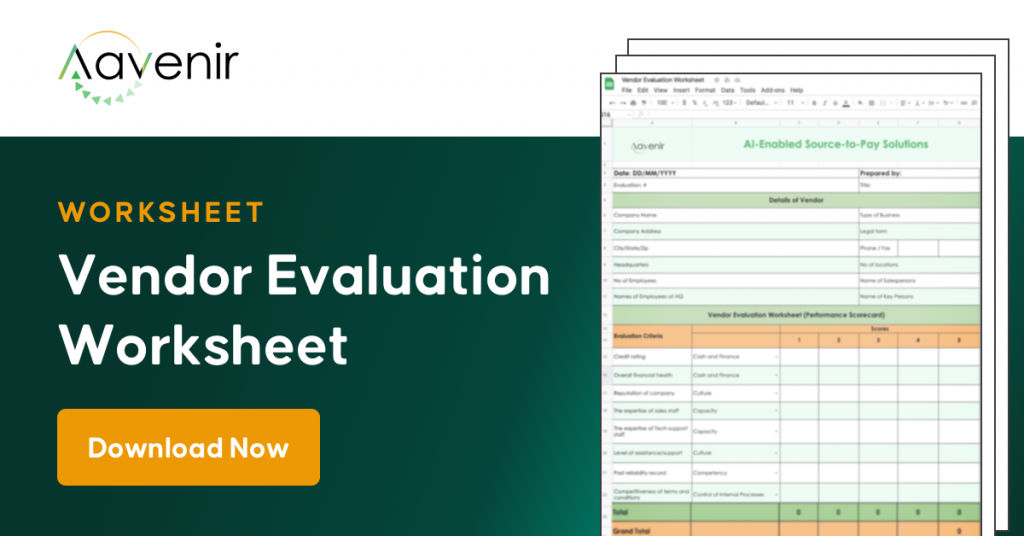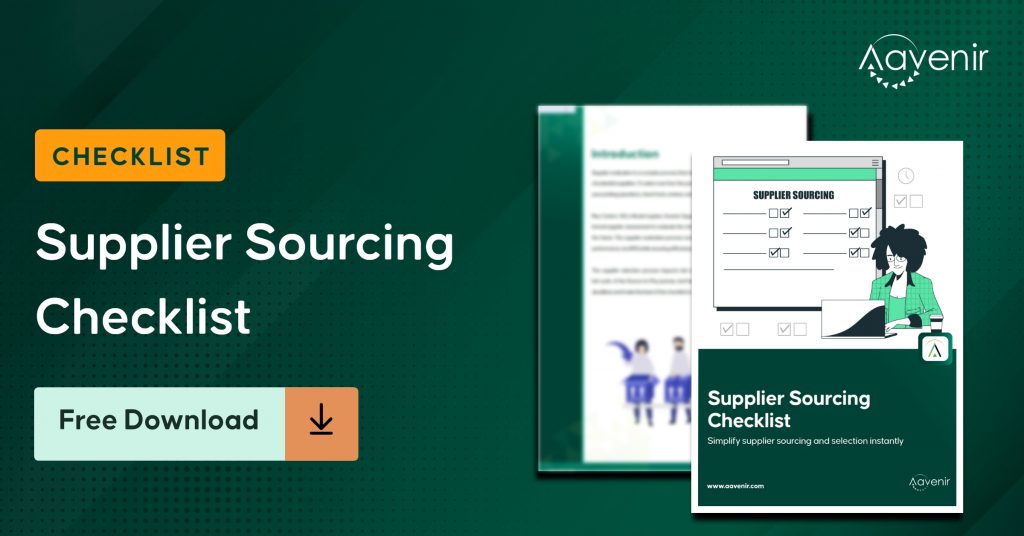What is ESG Compliant Sourcing?
ESG (Environmental, Social, and Governance) compliant sourcing refers to a procurement or sourcing process that takes into consideration Environmental, Social, and Governance (ESG) factors when selecting suppliers or vendors.

ESG (Environmental, Social, and Governance) compliant sourcing involves considering sustainability and ethical factors when choosing suppliers. The Procurement/ Manager plays a pivotal role by evaluating suppliers based on ESG criteria, incorporating these factors into contracts, and fostering sustainable innovation in the supply chain, thereby contributing to responsible sourcing aligned with broader ESG objectives.
Integrating ESG considerations into sourcing decisions, the Procurement Manager enhances supply chain responsibility and sustainability, generating positive impacts on the environment and society.
Understanding ESG Compliant Sourcing
When conducting ESG compliant sourcing events, you’ll need to establish specific criteria for supplier evaluation. This may include factors such as:
- Environmental performance: Assessing suppliers’ carbon footprint, energy usage, waste management, sustainable sourcing practices, etc.
- Social responsibility: Evaluating suppliers’ labor practices, worker safety, diversity and inclusion policies, and community engagement.
- Governance and ethics: Reviewing suppliers’ compliance with regulations, anti-corruption policies, and transparency in their operations.
Steps to Ensure ESG Compliance during Sourcing
The primary goal of a procurement manager is to efficiently source and acquire goods and services for an organization, ensuring the best value for money while maintaining quality and meeting operational requirements. Embracing ESG (Environmental, Social, and Governance) compliant sourcing enhances this process by integrating sustainability considerations into procurement decisions. This approach not only aligns with the organization’s commitment to responsible and ethical business practices but also mitigates risks, improves reputation, fosters innovation, and fosters long-term resilience, ultimately yielding substantial benefits for both the organization and society at large.
Here are the steps for it:
- Identify Focus Areas: Determine the key ESG focus areas that are relevant to your organization and industry. These could include environmental impact, labor practices, human rights, corporate governance, and community engagement, among others. Tailor your ESG compliance criteria to align with your company’s values and objectives.
- Questionnaire Sections: Develop a comprehensive questionnaire that suppliers must complete as part of the sourcing event. This questionnaire should cover all the identified ESG focus areas. Each section of the questionnaire should address specific ESG-related topics, seeking detailed information from suppliers about their policies, practices, and performance in those areas.
- Verify/Enrich Missing Data with Third-Party Data Sources: Some suppliers may lack sufficient data or may not provide complete information in their responses. To ensure the accuracy and reliability of the ESG evaluation, consider using data from reputable third-party sources like Ecovadis and MSCI. These organizations specialize in ESG assessments and can provide independent and objective data on suppliers’ ESG performance.
- Evaluate Suppliers: Use a scoring system or rating methodology to evaluate suppliers based on their ESG compliance. Assign weights to each ESG focus area based on its importance to your organization. For instance, if environmental impact is a high priority, give it a higher weight in the evaluation process. Then, assess the information provided by suppliers in the questionnaire and the data obtained from third-party sources to calculate their ESG scores.
- Transparency and Communication: Maintain transparency throughout the sourcing event and communicate the importance of ESG compliance to all participating suppliers. Encourage open communication and ensure that suppliers understand the significance of ESG considerations in the selection process.
- Continuous Improvement: Continuously review and refine your ESG compliant sourcing events based on feedback, industry best practices, and emerging ESG trends. Regularly update your questionnaire and evaluation criteria to stay current with evolving sustainability standards. Provide feedback to suppliers about their strengths and areas for improvement, and work collaboratively with them to enhance their ESG practices over time
ESG Compliance is No More an Option – Are you ESG Ready? Read More>>
Benefits of ESG Compliant Sourcing Events
1. Enhanced Risk Management
ESG-focused sourcing helps identify and mitigate risks associated with environmental, social, and governance issues. By addressing these risks proactively, you can prevent disruptions, protect your brand, and avoid potential legal and reputational issues.
2. Innovation and Product Quality
Suppliers that prioritize ESG often invest in innovative processes and technologies that can lead to higher-quality products and improved performance. Sustainable sourcing can drive product differentiation and add value to your offerings.
3. Cost Savings and Efficiency
Sustainable sourcing encourages resource efficiency, waste reduction, and energy savings, leading to reduced costs over time. Focusing on suppliers with strong ESG practices can lead to more efficient and streamlined supply chain operations.
4. Market Differentiation
Companies that prioritize ESG in sourcing can differentiate themselves in the market and attract environmentally and socially conscious customers. Your commitment to sustainability can become a unique selling point and contribute to brand loyalty.
5. Compliance with Regulations and Standards
ESG-focused sourcing ensures compliance with evolving environmental, social, and governance regulations and industry standards. Meeting these requirements demonstrates a commitment to ethical practices and responsible business conduct.
6. Enhanced Brand Reputation
Transparent ESG practices can improve your organization’s reputation and brand image, contributing to customer trust and loyalty. Demonstrating commitment to responsible sourcing can positively influence public perception.
7. Alignment with Stakeholder Values
Sourcing with ESG considerations aligns with the values of various stakeholders, including customers, employees, investors, and communities. This alignment strengthens relationships with stakeholders and enhances overall engagement.
8. Positive Impact on Communities
ESG-focused sourcing can support local communities by promoting fair labor practices, economic development, and social well-being. Your organization’s commitment to ethical sourcing can contribute to positive change beyond your immediate operations.
9. Sustainable Supply Chain
ESG compliance in sourcing contributes to the creation of a more resilient and sustainable supply chain. It reduces the risk of supply chain disruptions and ensures the longevity of your business operations.
10. Future-Proofing the Business
Incorporating ESG factors into sourcing strategies positions your organization to adapt to evolving market trends and regulatory changes. This forward-thinking approach can help your business remain relevant and competitive in the long run.
By incorporating ESG considerations into the sourcing event, businesses can not only mitigate environmental and social risks but also contribute to building a more sustainable and responsible supply chain. This approach aligns with the growing global focus on sustainability and can positively impact a company’s reputation, customer loyalty, and long-term success.
Explore Additional Resources To Know More




